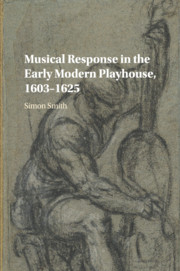Book contents
- Musical Response in the Early Modern Playhouse, 1603–1625
- Musical Response in the Early Modern Playhouse, 1603–1625
- Copyright page
- Dedication
- Contents
- Illustrations
- Acknowledgements
- A Note on the Text
- Abbreviations
- Introduction
- Chapter 1 Listening
- Chapter 2 Looking
- Chapter 3 Imagining
- Chapter 4 Remembering
- Coda
- Notes
- Bibliography
- Book part
- Index
- References
Bibliography
Published online by Cambridge University Press: 05 September 2017
- Musical Response in the Early Modern Playhouse, 1603–1625
- Musical Response in the Early Modern Playhouse, 1603–1625
- Copyright page
- Dedication
- Contents
- Illustrations
- Acknowledgements
- A Note on the Text
- Abbreviations
- Introduction
- Chapter 1 Listening
- Chapter 2 Looking
- Chapter 3 Imagining
- Chapter 4 Remembering
- Coda
- Notes
- Bibliography
- Book part
- Index
- References
- Type
- Chapter
- Information
- Musical Response in the Early Modern Playhouse, 1603–1625 , pp. 221 - 239Publisher: Cambridge University PressPrint publication year: 2017



